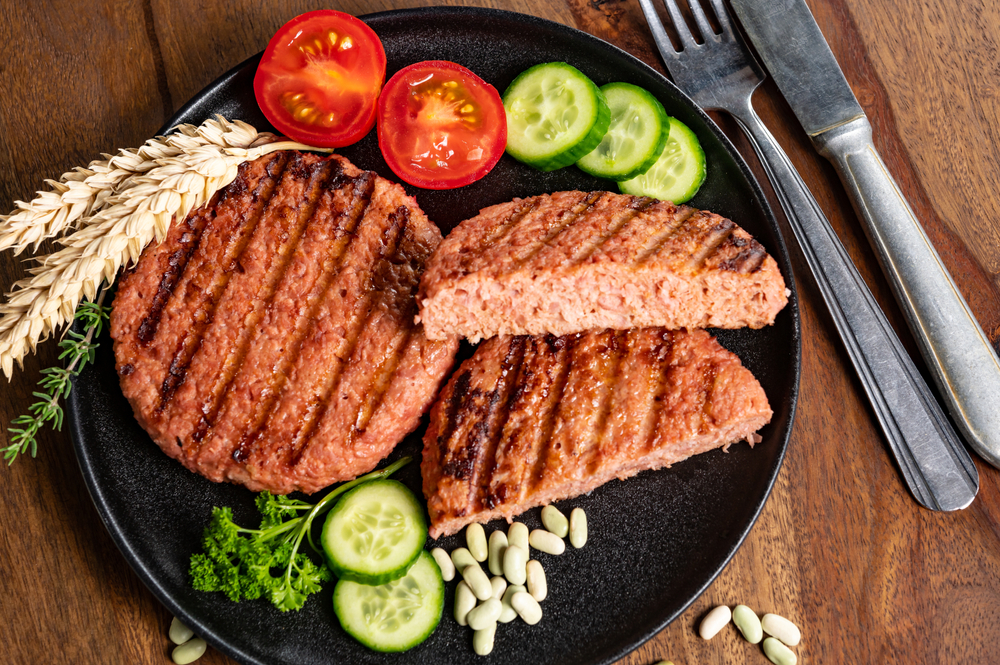Meat is a widely consumed food in today’s cuisine. For many, it’s an essential food that should be included in every meal. However, many preconceived ideas are prevalent in our societies, such as the belief that meat is necessary to get proteins. Often, people are misinformed and unaware that, in reality, eating so much meat could, on the contrary, harm their health. So today, we’ll see in this new blog that reducing meat consumption, besides being an ecological and economical action, is above all a way to take care of one’s health.

Meat is known for its contribution to proteins, vitamin B, and minerals, which are indeed essential for our good health. However, it’s often overlooked that it’s also an exacerbating factor in the development of cancers, cardiovascular diseases, diabetes, and obesity. To cite some figures, it’s estimated that consuming 100g of red meat daily increases the risk of colorectal cancer by 29%. Yet, an adult consumes around 530 grams of beef and pork per week. The ANSES (French Agency for Food, Environmental and Occupational Health & Safety) recommends a daily protein intake of 0.8g/kg/day, but an adult consumes nearly double, mainly in animal form, which show a reel problem.
In October 2015, the World Health Organization published a report establishing a link between red meat and cancers. This study highlights the fact that processed red meat, such as beef, pork, or other meats modified into ham, sausage, or charcuterie, is implicated in the occurrence of colon, pancreatic, and prostate cancers. This is due to certain chemical compounds that form during the processing or cooking of meat, such as polycyclic aromatic hydrocarbons or N-nitrosamines, classified as carcinogens.
Another compound, carnitine, is highly present in red meat. It’s metabolized by bacteria in the digestive tract, which then transform it into another compound: trimethylamine oxide (TMAO). The problem with this metabolite is that it’s classified by the medical community as a “facilitator” of atherosclerosis, a phenomenon of thickening and loss of elasticity of arterial walls. Consequently, excessive red meat consumption increases carnitine intake in the body, gradually altering the microbiota and making it more sensitive. This can lead to consequences on the cardiovascular system and result in cardiovascular diseases, stroke, heart attacks, and more.
Finally, let’s talk about diabetes. According to a study conducted in November 2013 by researchers from the French National Institute of Health and Medical Research (Inserm), meat consumption would increase the risk of developing type 2 diabetes. Indeed, the risk of diabetes associated with a meat-rich diet increases by 96% in women of normal weight. A study published in the American Journal of Clinical Nutrition reveals that consuming red meat more than twice a week increases the risk of developing type 2 diabetes by 62%. So be careful !
All these studies reveal the dangers of overconsumption of meat and should now persuade you to rebalance your diet, which, given the quantities of meat we consume, has a wide margin for reduction that should cause no harm to dietary balance, quite the opposite. And in the same time, the earth and your callet will thank you !

The above graph allows us to better visualize the contributions of each food item. We can see that the nutrients provided by meat are not exclusive to it. Most often, we have several alternatives. This shows that meat is far from irreplaceable. Let’s now take a closer look at what could help us improve our diet.
Firstly, for those who are not yet ready to completely abandon all forms of animal food, it is advisable to focus more on consuming fish and seafood. As for meat, it is recommended to eat less of it, but of better quality. This behavior has several positive aspects: it already allows you to eat good products, probably less modified and with fewer chemicals, but also to strengthen the local economy, support a consumption of nobler products, and fight against overproduction and intensive farming. So while continuing to eat meat, you can still redirect your consumption ethically and in favor of your health.
However, if you are ready to further modify your diet, you can find proteins in eggs or plant-based sources such as soy, tofu, beans, chickpeas, or lentils. These foods have the advantage of being rich in protein while reducing fat intake. For those feeling nostalgic, plant-based meat alternatives have been created. There are now plant-based nuggets, meatballs, steaks, sausages, and even minced meat. And these are foods that can be found directly in supermarkets. So don’t hesitate to try these new “meat” forms next time you go shopping!

It is also worth noting that they significantly reduce the possibility of diseases caused by meat consumption. To give you an idea, replacing the meat portion with its equivalent in nuts and legumes is associated with a 30% lower risk of developing diabetes. It is so much more safety.
With all this information, it now seems obvious to take the initiative of a dietary rebalancing, not only because there is no risk in reducing meat consumption, but also because the nutrients provided are very easily found in other foods. And as the saying goes, prevention is better than cure. Restricting meat intake in your diet is preventing against the risks of diseases. It’s also an opportunity to turn to new nutritional sources and a healthier and more balanced diet. So to help you in this transition, here are some very balanced recipes that will allow you to take a first step towards this evolution :
- Fried rice
- Vegetable curry
- Tempeh and sweet potato tacos
- Mushroom risotto
- Stuffed tomatoes with rice
- Zucchini crumble with sun-dried tomatoes and thyme
I hope you enjoyed this blog ! I will enjoy to read your impressions in the comments.

